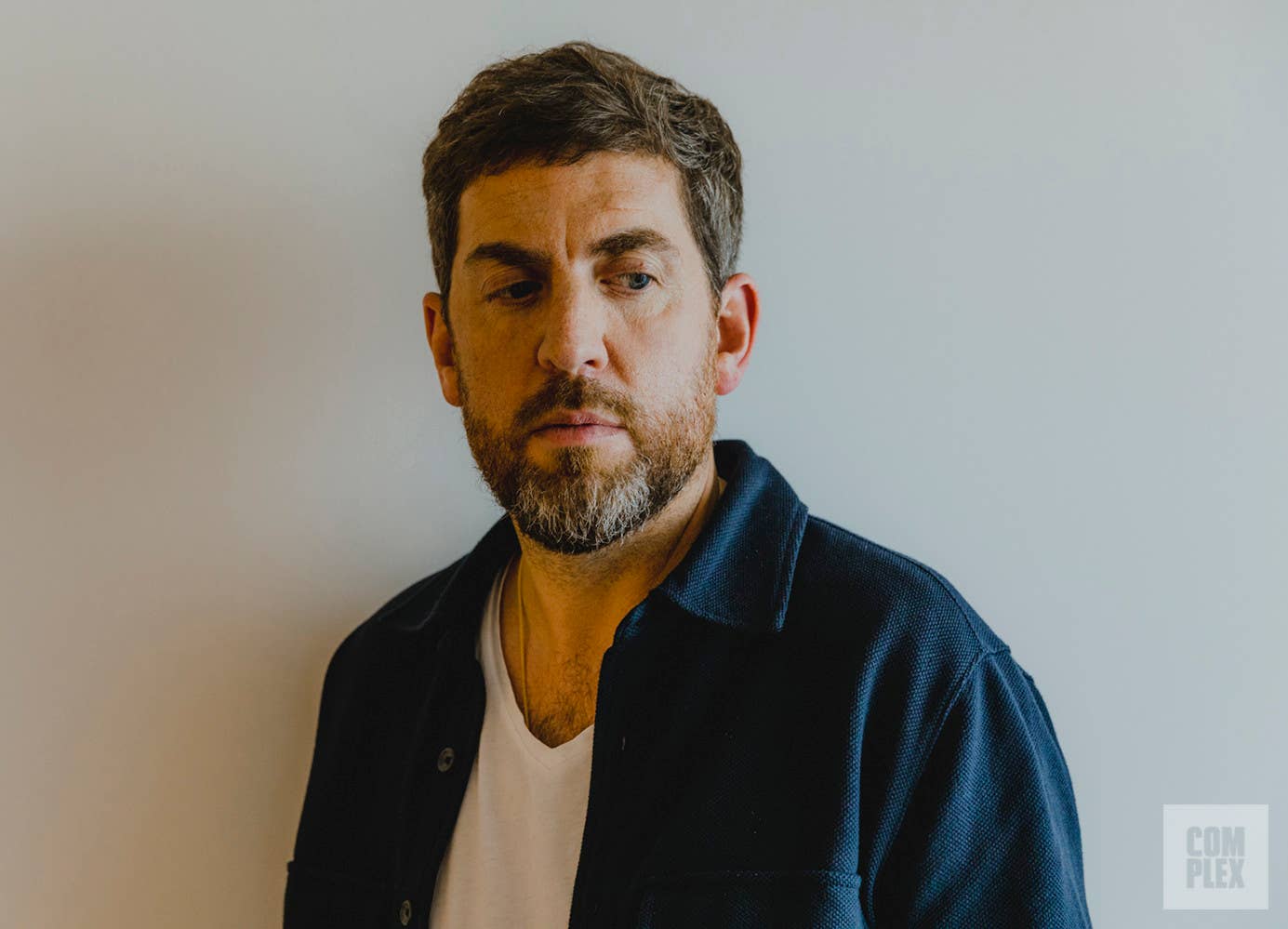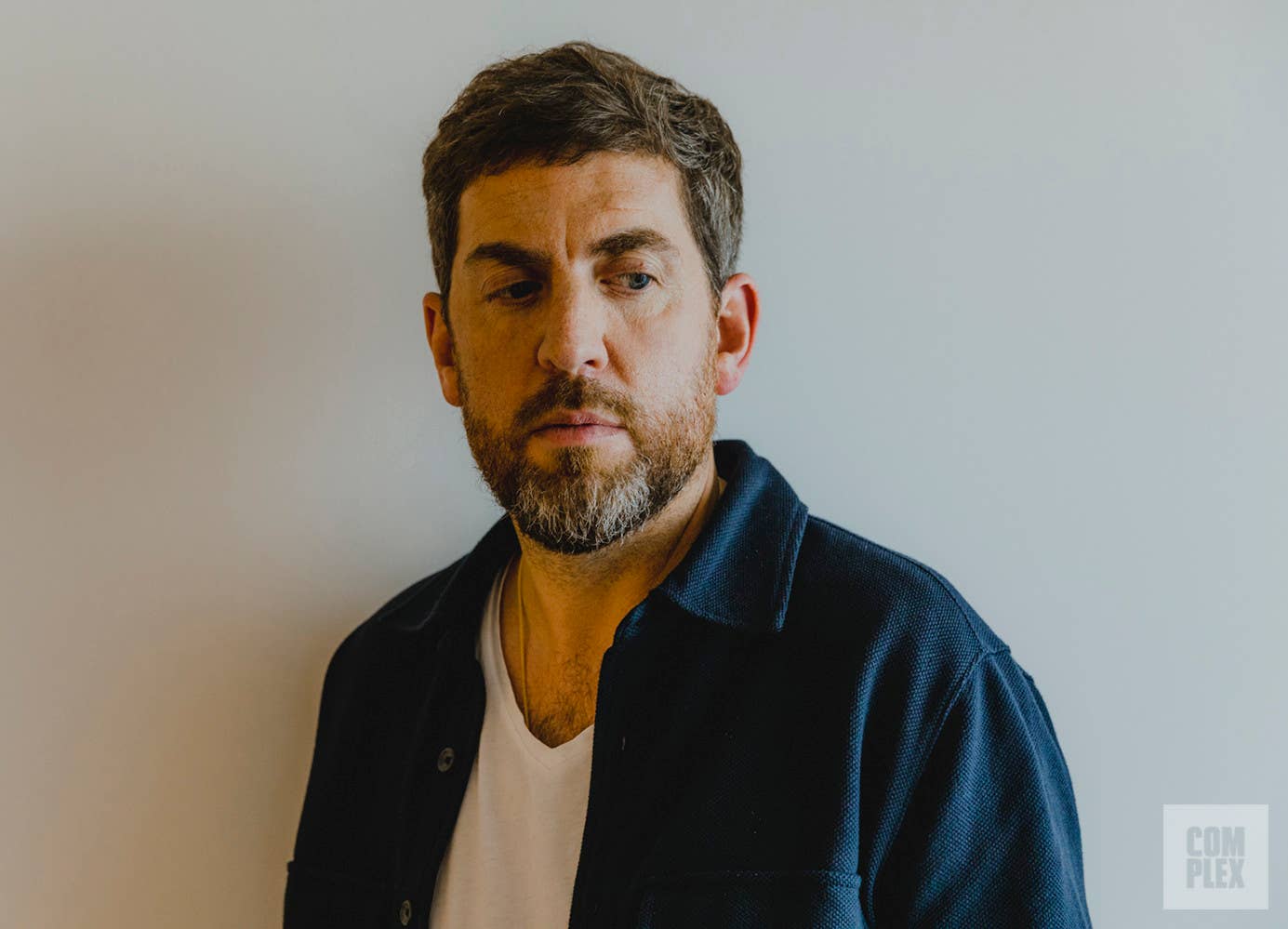
Max Lousada has already had an extremely busy week,and it’s only Tuesday.
He was just in Nashville a few days ago, getting dinner with Blake Shelton and Zac Brown Band at the Country Music Awards. From there, he made a quick stop in Los Angeles, going on a hike with longtime friend Zane Lowe and celebrating the release of Silk Sonic’s new album, before an overseas flight for the MTV Europe Music Awards. Then he hopped on another flight to New York City, where he’s now sitting with me for coffee at The Crosby Bar in lower Manhattan.
Today, Lousada has had a full day of meetings, including one with Variety, which just named him the Executive of the Year. Just moments before sitting down with me, he was deep in conversation with famed stage designer Es Devlin, known for her iconic work with artists like Kanye West and Kendrick Lamar. And a few short hours from now, he’ll get back on a plane home to London for more meetings with artists and executives.
Wide-eyed and speaking a mile a minute, he seems completely unfazed by the hectic schedule. Lousada always has busy weeks, after all. As the CEO of Recorded Music for Warner Music Group, he oversees WMG’s global recorded music operations, including a family of labels like Atlantic Records, Warner Records, Elektra Records, and Asylum Records. In the process, he’s helped propel the careers of everyone from Ed Sheeran to Dua Lipa to Roddy Ricch.
So why is one of the most powerful men in music sitting down across from me, ready to speak candidly about an industry that hasn’t always been as transparent as it could be? Well, Lousada isn’t your typical major-label CEO.
At 48 years old, he’s younger than many of his contemporaries, and he has a reputation for breaking tradition and shaking things up when he needs to. Shortly after taking his current seat in 2017, he made headlines for making major leadership changes. He’s known for taking big swings and closing major deals, like Warner’s freshly announced acquisition of 300 Entertainment, the Kevin Liles-helmed label home to stars like Young Thug and Megan Thee Stallion. Working closely with Warner Music Group CEO Stephen Cooper and a network of ambitious label heads, he’s helping to position WMG as a nimble company that embraces change.
Lousada is aware of the misconceptions that many people have about the music industry, and he knows that some of those problems could be solved with more open communication from high-ranking executives like himself. That philosophy is what led us here on a cold afternoon in mid-November, meeting for a wide-ranging conversation about the state of the music industry, where it’s heading, and how WMG fits into it all.
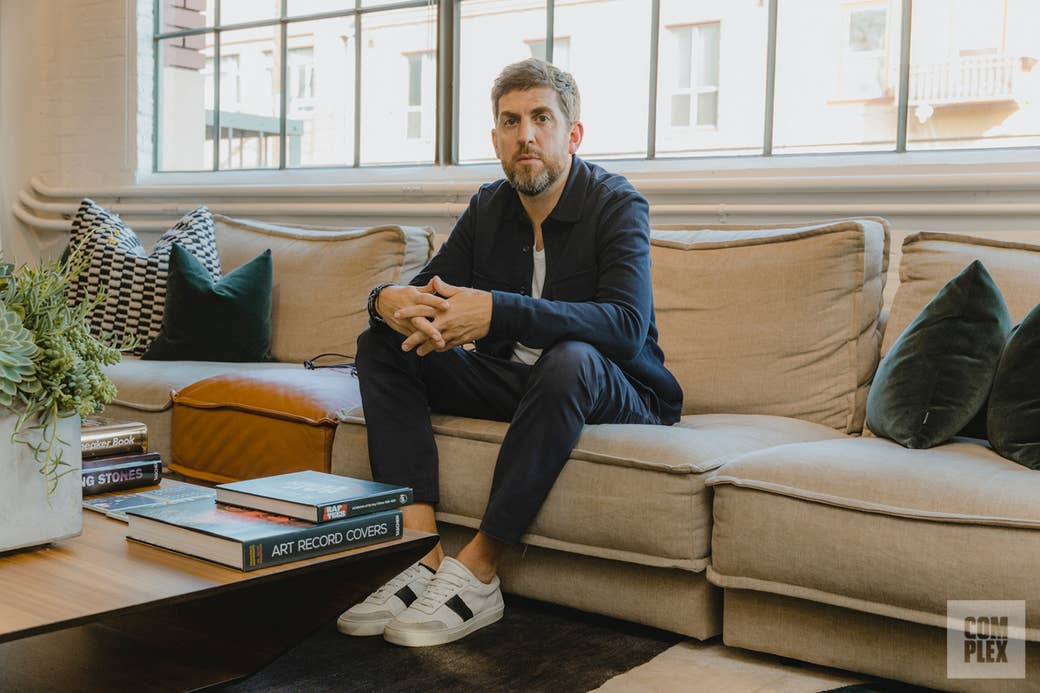
A waiter pours each of us tall glasses of iced coffee, and I ask the most open-ended question I can think of, hoping to get a peek inside his brain at this very moment: What’s been on your mind lately?
At first, Lousada responds with a fairly abstract answer that veers towards corporate-speak: “I’m obsessed with supporting artists to drive culture, and for that culture to drive consumption.” Then he pauses and reconsiders his words, offering a more straightforward response. “What I mean by that is, there is this narrative in the market that streaming services break acts,” he says. “And I’m like, ‘No, streaming services reflect culture.’ I think this idea that people can just get playlisted and build careers is not true. It’s overly simplified. So what I’m obsessed about is ensuring that artists have transparency about how they can develop their fans, and we can show them how to grow organic consumption.”
Much more quickly than I expected, his comment steers the conversation to the topic I wanted to discuss most. In the streaming era, when artists have the ability to share music directly with fans, many of the old distribution models are now obsolete, leading to some confusion about what a label really does for artists these days. So I ask Lousada how he would describe the role of a record label in 2021.
As he puts it, “Even though distribution is being democratized, it doesn’t mean the art has. Just because you can get it out in a free way, it doesn’t mean it’s going to be successful or seen. So, ultimately, a record label’s role is to develop a creation culture where the artist can feel inspired, supported, can live, can pay for recordings, and can create the record that they truly want to make.”
Describing the long-term value that musicians get from labels, Lousada throws out one of his favorite phrases: “artist development.” Noting that WMG has “5,000 people in the globe working for our artists,“ he points out that there’s a whole network of people who can take care of things that are difficult for artists to accomplish on their own. This includes everything from connecting them with the right songwriters and producers to securing recording spaces to executing worldwide marketing campaigns to securing licensing deals to analyzing complicated data.
“For me, it’s about trying to drive an independent mindset through to a major music company.”
In a fast-paced, constantly changing industry, stability is important for artists, and Lousada says, “It is great to have the consistency of a music company, when artists have to deal with managers coming in and out, ticket sales going in and out, and other uncertainties. There’s a real security to having someone continuously investing behind your art.”
He’s quick to clarify that artists don’t have to sign with labels if they don’t want to, though. And if they do decide to partner with a label, there are many types of deals they can choose from in 2021. Lousada argues that the rising number of options available to artists is pushing the industry to a much better place than it’s been in the past.
“The big thing that’s happened since I started is: artists have all this choice now,” he says. “From, ‘Do you want to go direct? Do you want to go independent? Do you want services? Do you want a full record company? How do you want your legacy to be managed?’ That’s an amazing intersection for a music company to be at.”
When Lousada gets excited about something, he starts speaking fast, wrestling with multiple ideas at once. This is one of those moments.
“Choice keeps the relationship honest,” he exclaims. “Artists have choice, and music companies have to keep the evolution of value and expertise appropriate to what’s happening today. Whereas before, there was a complacency from record companies that were like, ‘No, we’ve got this. You only have to go through us.’”
Lousada says there are a lot of things for artists to consider when signing deals: “‘Is it a smart business decision? Is it smart to take this investment and take less of a margin on the records to grow the overall bigger part?’ And that really depends on, what are all the other areas of the businesses that they want to grow? That should be a thoughtful decision that many artists make.”
With an extended network of labels and services, Lousada says WMG is positioned to cater to all of these options. “It’s about allowing artists to decide how they want to interact with music companies,” he explains. “At the very beginning, there was only one route. Now there’s many routes. And I want Warner to be a conscious choice, whether you go through ADA, which is our distribution services, whether you go through Level, which is our digital aggregator, or whether you go through Atlantic, Warner Records, or Elektra or any of our joint ventures. These are artists’ choices.”
For the artists who do choose to enter deals with major record labels, Lousada says their overall opportunities are amplified. When I bring up the fact that artists sacrifice a percentage of their revenue to the labels they sign with, he responds, ”But the pie grows bigger. And your total take gets bigger, because you’ve got someone continuously putting risk investment behind your brand or your act.”

Independent artists have seen a lot of success in recent years, but without the backing of a major music company, Lousada argues it’s still very challenging to have true global impact at the highest level, explaining, “All of the biggest artists in the world have a strategic relationship with a big music entity, so if you want to have a hit, the best success of having a hit is to go for a record company.”
Circling back to the idea of choice, he continues, “I would argue that if you don’t want to have global success, or even big regional and local success, and you really want to play within a very small demographic or really small audience, maybe the distribution or the service option is an interesting route to discover. But if you are looking to have a wider team that can understand all of the input, and understand all of the messages, like, ‘Why is your YouTube video working? How are people listening to your record? Why is your R&B record blowing up in the Philippines, and what does that mean?’ Then you want a company that has extended resources.”
That brings us to the issue that’s become completely inescapable in every industry lately: data. Every artist has access to some data about their music, but Lousada says major record companies like WMG are better equipped to make sense of that data in a useful way. “In a world where you can measure shit, let’s be truthful about what moves the needle,” he says. “Let’s really present to our artists what the impact that they can have is, and give them this choice and this knowledge that they can make their best decisions for themselves.”
Describing WMG’s ability to make sense of an unfathomable amount of data on a daily basis, Lousada tells me, “I think we ingest about 5 billion data points a week. We congest it into filters where we can see trends, we can see spikes, we can see sentiment. That ability to read a record from its very early flicker, and turn that flicker into an opportunity to invest and to understand where the investment is working and when it’s not, is an amazing tool to provide an act.”
Of course, focusing excessively on data has its drawbacks, too, especially for a record company. Lousada has seen the beneficial power of data when it comes to promoting music, but he says it’s still very important for humans to guide the ship when it comes to discovering new talent.
“From a marketing point of view, we are getting better because of data,” he explains. “But from a discovery point of view, data has to be carefully ingested. Data does not always reflect cultural relevance. Data does not always reflect the predictability of a career. And data does not always guarantee an aligned vision. We are at the very beginning of how much data to invest behind and how much we don’t. The constant battle is vision, belief, and data, and making sure that we can get that balance right.”
Comparing the way a music company like WMG approaches data to the way streaming companies do, Lousada says the main difference has to do with a human touch.
“A music company is people and technology—it’s about that collision,” he states. “And DSPs are about technology and a small bit of people. I think we would say we are 60 to 70 percent people and 30 to 40 percent technology. That is what you get with our record companies. You get the service of a wide, thoughtful, educated, and passionate team with a technology platform that gives them the best data.”
Throughout our conversation, Lousada touches on ideas he views as long-held misconceptions people have about the music industry. One of these narratives is that major record labels are full of people who want to take advantage of the artists they sign. I ask him where he thinks this idea came from, and he points to a specific era in the history of the music industry.
“I think that narrative probably came from the CD boom,” he tells me. “I think it was a period when record companies felt they were entitled, and they didn’t have to earn the respect of the artist. I think we all know now that we serve artists, rather than artists serving us. And I think that’s a shift. There’s a historical view of, ‘These are people who don’t understand my music.’ But people at Warner, and in all the labels, love music. They’re in studios until 5 or 6 in the morning. They’re in it. They want their artists to win. They’re putting their livelihoods alongside the artists. Back when there was so much control that the record companies had, there was a resentment of the lack of choice. And I keep going back to the choice thing, because I think it keeps the relationship honest.”
Lousada is aware that many of those narratives persist to this day, and he acknowledges there’s a fear from some artists about having their creativity controlled. Others worry that a label will steer them to “go too pop.” But he counters, “The reality is, the credibility of our acts is what makes them relevant and commercial. And I think there is this understanding that you can’t bully the market. The fans are too sophisticated. We have to give fans the ownership and the engagement with our acts, and we have to make that relationship feel really dynamic.”
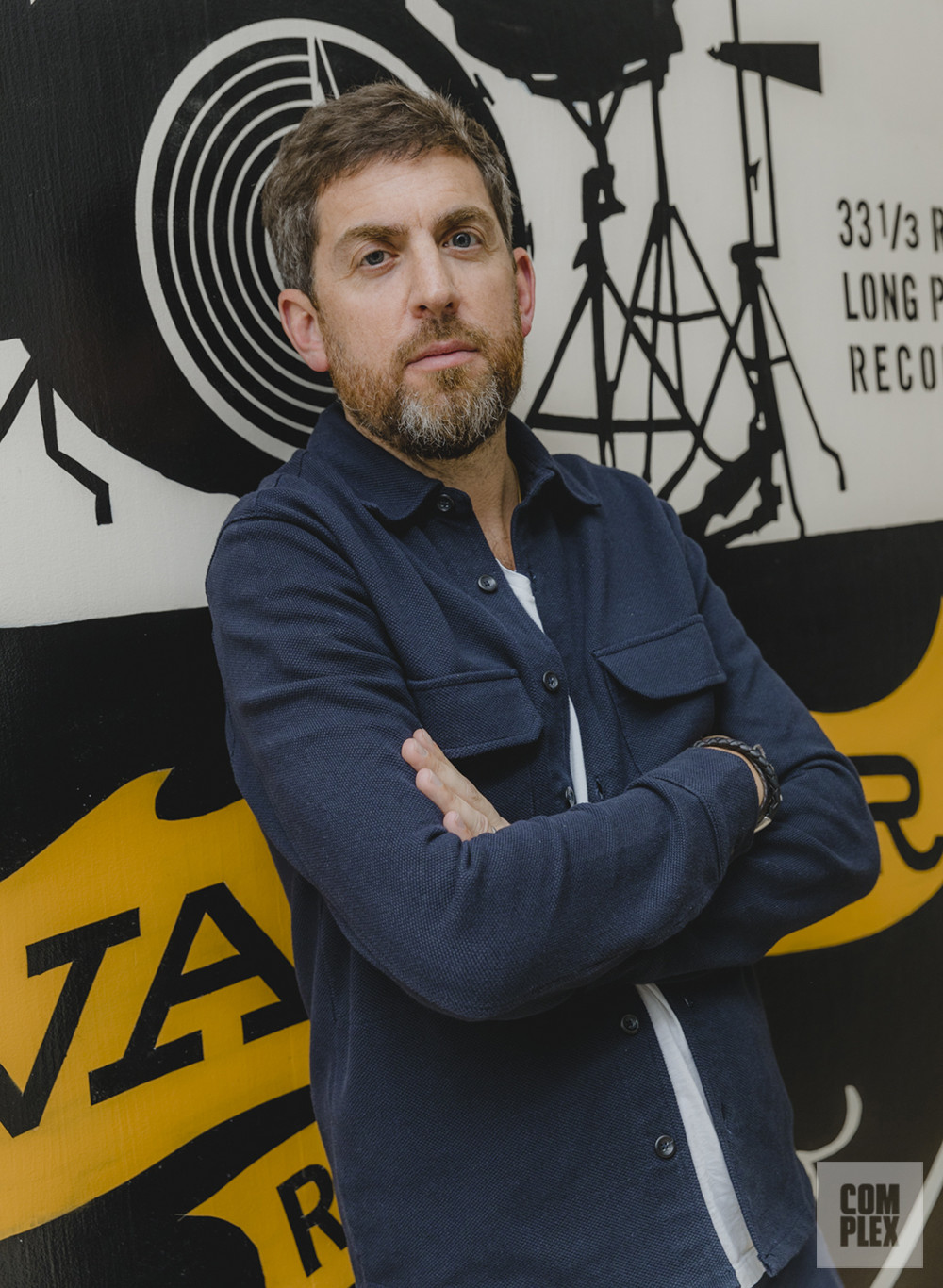
There’s a perception that major-label CEOs often become out of touch and unapproachable by the time they reach their lofty position, but Lousada comes across differently. In conversation, he peppers his sentences with references to emerging artists (he brings up rising Los Angeles rapper Remble on several occasions) and fringe technological trends. And when he speaks about WMG, he makes a point to specifically call out each of the young executives he works with by name.
If you spend any amount of time with Lousada, you’ll notice he’s in a constant state of information-gathering. Midway through the interview, he reverses roles and asks me questions. Knowing I spend a lot of my time interviewing rising artists, he asks what they tell me about their relationship with labels and how they want it to improve.
This is how he stays out of the dreaded “CEO bubble,” where the sheer volume of daily meetings and responsibilities makes it difficult to stay in touch with the day-to-day music conversation. He says he surrounds himself with a team of people “who are really in it,” and he tries to pull new insights out of every conversation he has with experts in their respective fields. And, of course, it helps that he’s still a fan. “I just love music,” he says, mentioning he was watching Kanye West’s Drink Champs interview along with all the rest of us, and that he constantly stays in tune with daily music conversations.
In an effort to stay in tune with the needs of artists, Lousada says he keeps in close contact with artists in the WMG family. “A big part of my day is speaking to all of the biggest artists, whether that’s going for lunch with Jimmy Page last week and understanding how he wants to kind of create Led Zeppelin,” he reveals. “Or discussing how Coldplay sees their next two or three years with Chris and the band. Or looking at the next 18 months with Ed Sheeran.”
These conversations make him aware of the challenges that artists face in 2021. As an example, he brings up the increasingly overbearing toll that social media takes on musicians.
“Listening to artists’ challenges with the world of social media, you realize part of our job is to protect them from the constant attacking—the hate clip world that we live in—and realize that’s what they go through every time they release a piece of music,” he says.
“The big thing that’s happened since I started is: artists have all this choice now. Choice keeps the relationship honest.”
Part of the reason Lousada is able to stay so approachable has to do with his backstory. Before taking the seat that he holds today, he worked his way up through more humble positions, getting a firsthand look at the inner workings of the music industry from various perspectives.
As a teenager in London, he remembers obsessively hunting for records at shops like Black Market Records and Honest Jon’s during the day, and then going to see DJs at clubs and house parties at night. “That’s really where I got the passion of loving everything from The Clash to EPMD to Buju Banton,” he says.
Before long, he got involved with the music business himself. “I started a company with four friends called In A Silent Way, which was after my favorite Miles Davis record,” he recalls. “And that was really us wanting to deliver hot 12-inches and LPs to the DJ community in Europe. We set up a company that was just an import-export company. By importing records that we loved, we built a reputation while there was this buoyant independent music scene, globally.”
It was a formative experience for a young Max Lousada, and he continues to work with some of the same people to this day. “Many of the relationships I have today started when I was 19 or 20,” he reveals. “All of these great music people were experimenting in this independent space. That led me on to loads of different chapters. That led me on to realizing that I would like to do a label.”
Lousada bounced around from there, working with small music companies before starting his own independent label called Ultimate Dilemma. Then he caught the attention of Brian Brater and Jarret Myer, who had recently started Rawkus Records. The New York City-based hip-hop label was looking for a larger footprint outside of the United States, and Lousada was brought in to help expand its presence in Europe.
“We went on this incredible journey of putting some of my favorite records out and creating a European network,” he says, remembering his time working with artists like Pharoahe Monch and Mos Def (the first record he ever got onto Radio 1 was “Ms. Fat Booty”). “None of our American counterparts were putting as much passion into the globe as Rawkus was.”
Around this time, Lousada started getting more involved with Mushroom Records, which funded Ultimate Dilemma. On his first day with Mushroom, he signed his first major breakout act, Zero 7, “and within seven months that record had sold a million copies,” he says, referring to their 2001 debut album, Simple Things.
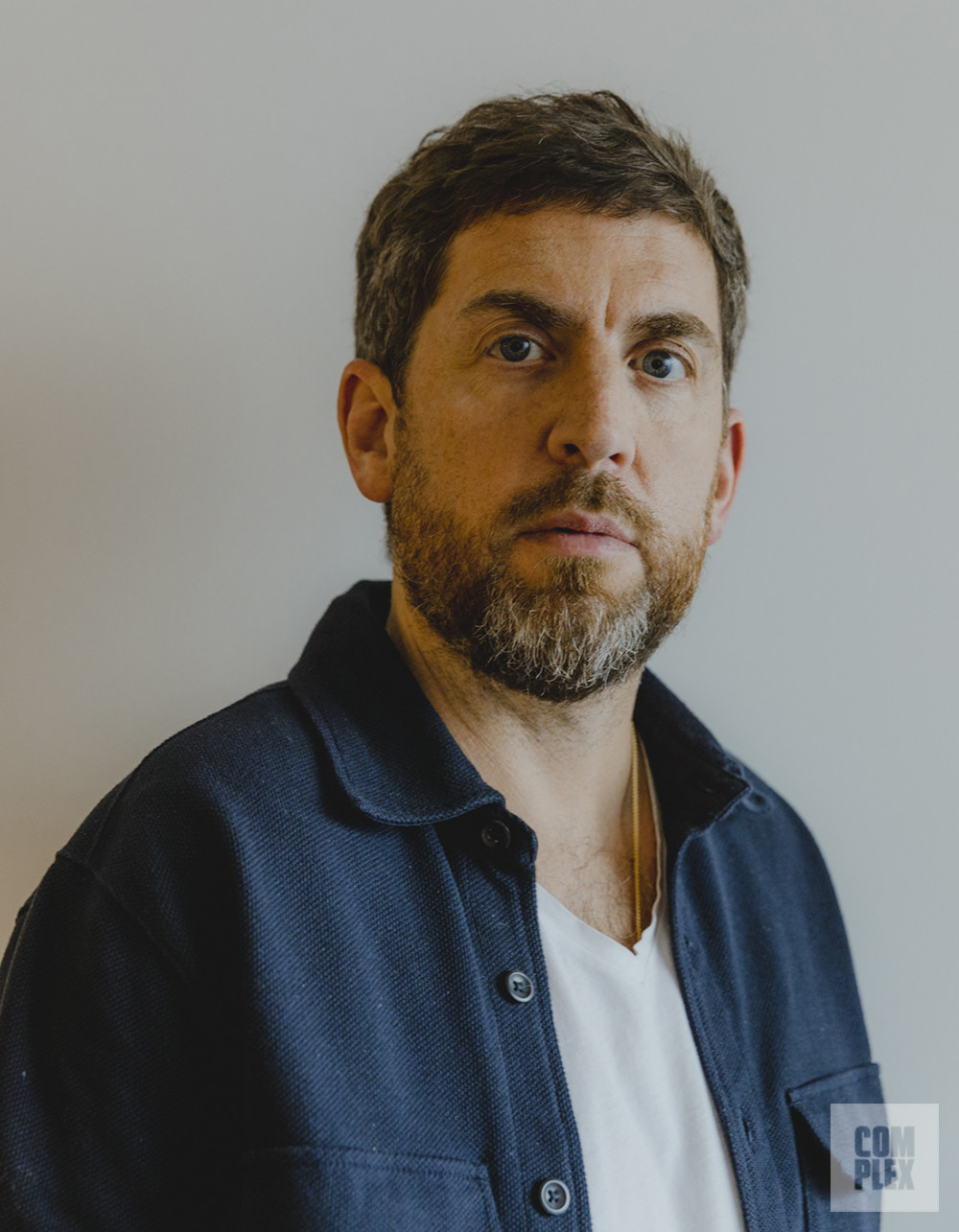
By 2002, he became Mushroom’s head of A&R, which he describes now as his “university period,” when he “learned how to really make records and have a conversation about what records will work, and what records won’t.” He adds, “I could credibly say when the hi-hat was too high or where they needed more reverb, or where we needed to edit a record.”
In 2003, Mushroom was sold to Warner Music and Lousada moved on to East West Records, which he quickly helped rebrand to Atlantic Records. As the head of Atlantic Records UK for nine years, he remembers going on “an incredible run” that included the breakout success of artists like Ed Sheeran, Paolo Nutini, James Blunt, Rudimental, Plan B, Lykke Li, Marina and the Diamonds, and Birdy.
On the heels of that hot streak, Lousada was named chairman and CEO of Warner Music UK in 2013, where he oversaw their UK family of labels and imprints. “That was a real experience of actually just working alongside great heads of labels, whereas before I had been one,” he notes. “It was my turn to step up.” He made the most of the opportunity, growing market share and helping foster the careers of everyone from Royal Blood to Dua Lipa.
After four years, it was time to tackle his biggest responsibility yet. Lousada stepped into his current role, CEO of Recorded Music at Warner Music Group, in 2017.
Describing his biggest responsibilities as CEO, he tells me, “The role goes into three buckets. First, it’s about setting a north star of the values of what a music company should be, and building a strategy about being an artist-first company.”
He says he communicates with WMG CEO Stephen Cooper “very regularly,” working with him to plan out the companies’ larger priorities and vision. And Lousada meets routinely with a team of “incredibly talented executives, whether that’s Julie [Greenwald] and Craig [Kallman], who run Atlantic, or Tom [Corson] and Aaron [Bay-Schuck], who run Warner Records, or Alejandro [Duque], who runs South America, or Temi [Adeniji], who runs South Africa music issues.”
“Together, we address music issues, like, what’s hot?” he says. “Who are we going to break? How does Silk Sonic feel today? What are people starting to listen to more? And my other world is looking at the music, reading those records, and finding ways that we can, as a company, come behind them and really push them out into the world in an aggressive and thoughtful way.”
“From a marketing point of view, we’re getting better because of data. But from a discovery point of view, data has to be carefully ingested. Data does not always reflect cultural relevance.”
Lousada’s experience working up the various ranks of the WMG system for the past 22 years and working with independent labels gives him an edge over other CEOs. He’s seen the music industry from the perspective of indie labels, and he wants to bring that ethos to his current role.
“For me, it’s about trying to drive an independent mindset through to a major music company,” Lousada tells me. “My intent is for us to be seen to have that entrepreneurial independence, but with the scale of a major music company, and I want to do that in an artist-first approach.” Explaining how he’s accomplishing that goal in practice, he adds, “We have partnerships with incredible entrepreneurs or independent labels who we support, and that’s very much part of who we are. A lot of our success has come through joint ventures of DJs, producers, studios.”
In 2021, Lousada has his hands on the reins of one of the world’s biggest music companies. But in his mind, he still has the same mentality he had when he was a rebellious kid running around London collecting records as a teenager.
“I’ve never felt comfortable with the word ‘corporate,’” he reveals. “And I’ve always believed that there should be anarchic-ness and chaos in an organization to allow opportunity and to allow creativity to happen.”
Considering the seat he occupies, Lousada surprises me by openly embracing an anti-establishment ethos. You would think someone in his role would be obsessed with control, but he happily encourages a healthy amount of rebelliousness from musicians.
“I think, in hip-hop there’s always been the badge of independence,” he offers. “There’s always been the badge of ownership. I think that’s because it’s punk rock. It’s like, ‘Fuck the man.’ Isn’t that an attitude that we want? We want a bit more of that tension. We yearn for that. We celebrate that. I think artists should continuously challenge the establishment. That is what they’re there for, from a cultural point of view. And if they can challenge record companies to evolve themselves better and better, that should be celebrated.”
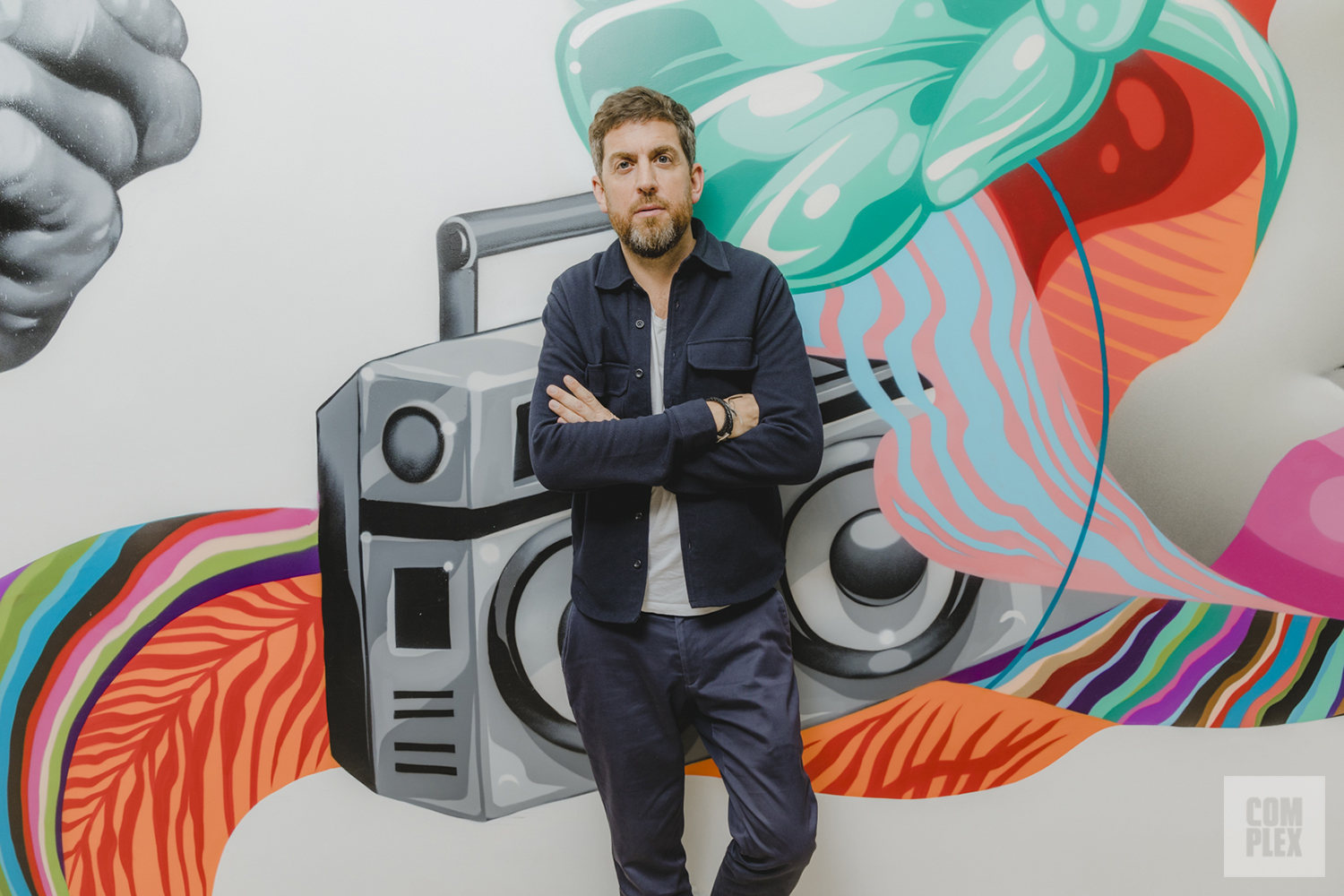
Many weeks in Max Lousada’s life start on Mondays at 5:40 a.m. in London. He jumps into a car and heads towards Heathrow Airport for a flight to New York City at 7 a.m. And by 11:30 a.m. ET, he’s in his NYC office, ready for a week full of meetings.
This globe-trotting lifestyle is fitting for an executive with Lousada’s goals. Anyone who speaks with him will notice he uses one word more than any other: “global.” And he has good reasoning for his emphasis on global expansion.
“Let’s be honest, from what we can see, Anglo music will decrease in global listening,” he points out. “The Asian market will probably be the biggest global market in the world for music. The onboarding of African music, in terms of its ability to be distributed digitally, is going to increase in volume. The success of South American Latin music, with such a big population, will continue to grow and evolve and influence.”
He tells me international markets are consuming their own domestic music at much higher rates than they have in the past. Breaking that down, he brings up some examples. “Over the last six to seven years, Latin music has gone from 20 to 30 percent domestic to 70 percent,” he says. “And that general trend of domestic music is happening in every market. So when I talk about that, I talk about the fact that German hip-hop fans are buying German hip-hop. French hip-hop fans are buying French hip-hop. That didn’t used to happen. People want local-language hip-hop, which is a big change”
In the past two years, Warner Music has expanded to countries like Vietnam, India, Turkey, and Peru. Every few weeks, it seems there’s another announcement about expansion into a new corner of the world. One day, there’s news about the launch of a pan-Asian dance music record label called Whet Records. The next, a press release pops up about Warner Music launching Atlantic Records Benelux, which focuses on hip-hop in the Benelux region.
Of course, all of this would be futile without the right leadership in place. Lousada has been vigilant about appointing new leaders since the very first days of his run as CEO, and it continues to take up much of his daily focus. He says he’s changed over 19 leaders so far, including many international appointments. To name just a few of the new leaders, there’s Dallas Martin (president of Asylum), Steve “Steve-O” Carless (president of A&R at Warner Records), Karen Kwak (EVP and head of A&R at Warner Records), and Joe Kentish (president of Warner Records UK).
“I think artists should continuously challenge the establishment. And if they can challenge record companies to evolve themselves better and better, that should be celebrated.”
At this point in his life, Lousada says he’s embraced the fact that he doesn’t know everything, and he’s learned that constantly listening to the ideas of other executives will only help him in the future. With that in mind, he puts a lot of trust in other leaders and avoids hovering over them too closely. “The relationship I have with my labels, it’s very much a partnership,” he says. “I give them the autonomy to run their labels. All of these labels have creative control and independence.” He adds, “I want to have that independent thought as a company. And I think that’s differentiating. It’s attracting a different kind of artist, a different kind of executive, and a different kind of attitude.”
Less than a month after our conversation, Warner Music Group closes on a deal to acquire 300 Entertainment. In the process, co-founder Kevin Liles is appointed chairman and CEO across 300 and Elektra Music Group. For Lousada, it’s yet another opportunity to add a successful independent label to the WMG family and expand its footprint.
“Warner’s history has been about this network of independent labels, so we are always looking for labels that are closest to culture, that champion artist development, and that have a strong roster and team,” he tells me over the phone right after the deal is inked. “We had a historic relationship with Kevin and Julie from back in the Def Jam days, and we have been distributing 300. They very much run their own ship, but we’ve delivered global distribution, so there has always been a connective tissue.”
I ask what impresses him about what the 300 Entertainment team has built since the label’s inception, and he responds, “300 has built an extraordinary brand. It’s one of the great US success indies out there, and our aspiration is to maintain the secret sauce within that company and allow 300 to continuously grow and make a bigger impact.”
Another recent focus for Lousada has been the launch of a services division called WMX. It offers artists assistance with merch, e-commerce, world tours, gaming, content, collaborations, VIP experiences, and more. Led by Maria Weaver, it’s a rebrand of Warner-Elektra-Atlantic (WEA), and Lousada says “we’ve brought a whole artist-fan experience team” into the fold.
“WEA was meant to solve the global distribution problem that they were having competing with the other majors,” he explains. “WMX is an evolution of that, where we can be the backbone of opportunity for everything from merchandise to NFTs to brands.”
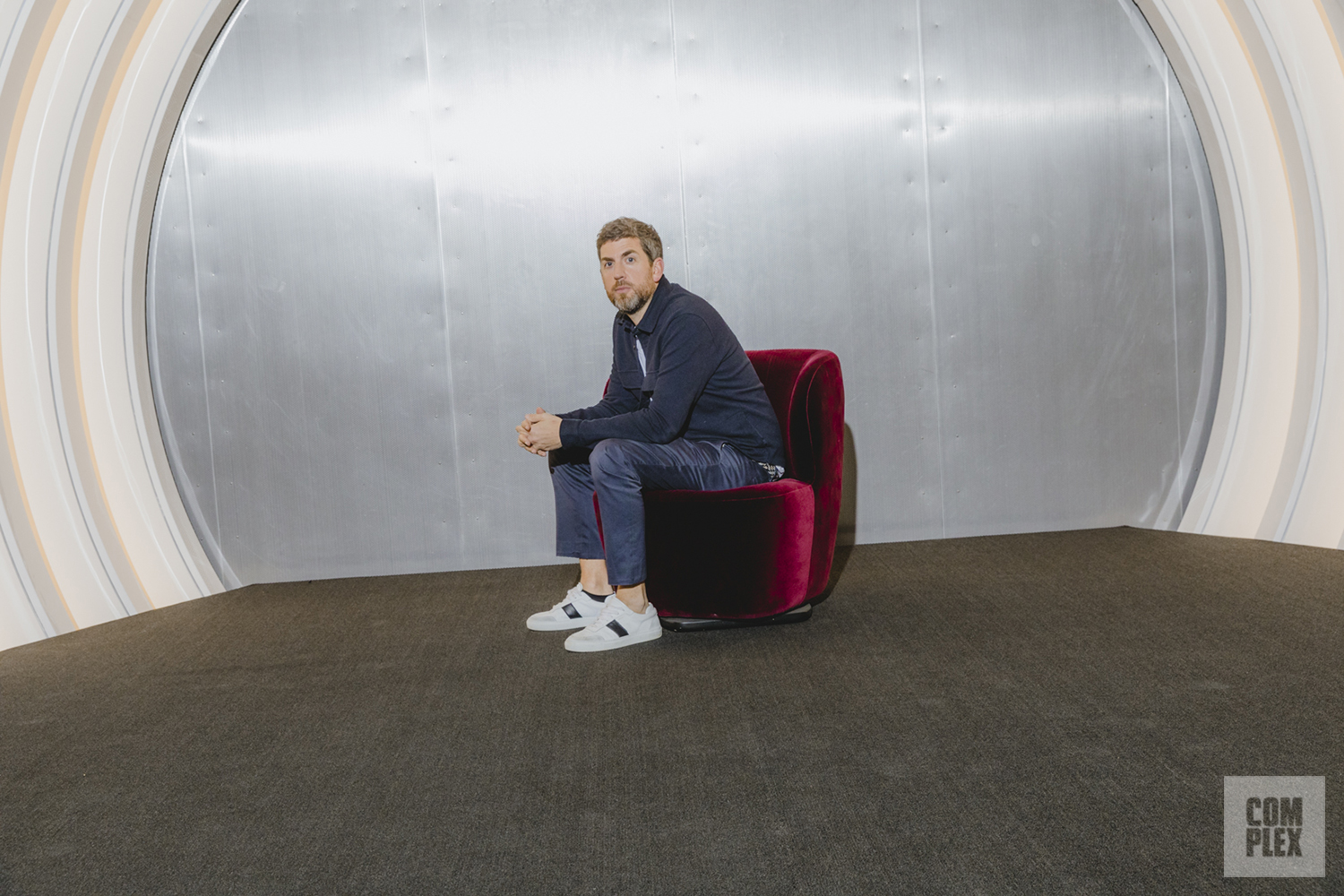
There’s a perception that major record companies are slow to embrace change, so I ask about the latest innovations that could potentially shake up the industry: blockchain technology, NFTs, and other trends in the crypto space.
“If you look at the history of music, it has continuously disrupted the different horizons of distribution,” Lousada responds. “It feels like NFTs and virtual merchandise are an extension of a fandom experience. I think how blockchain works and how blockchain distribution works, it is very nascent. You’ve got small companies that are experimenting, but I think that just makes the music landscape and people’s engagement with music that much richer.”
He brings up ways that WMG has embraced emerging digital spaces recently, like its financial investments in Roblox and a virtual music experience company called Wave. “This is where a lot of kids spend the majority of their time. And if they’re going to spend their time gaming or interacting or talking, they’re also going to be listening and buying and experiencing. So whether it’s us putting 21 Pilots on Roblox or Ed Sheeran on Pokémon Go, these are different marketing and promotional opportunities or commercial opportunities.”
Lousada doesn’t pretend to know exactly where all these innovations and disruptions will shake out, but he promises WMG will experiment and have fun with it all. “We see it as a growth area on top of the streaming growth,” he says.
One thing he is sure about is the importance of artists getting compensated for their work. That’s why, among other initiatives, WMG struck a multi-year licensing deal with TikTok in January 2021.
“Our job is to make sure that artists get paid,” Lousada says, point-blank. “A lot of the experimentation pre-streaming was done free, and no one was getting paid. Whether that’s Twitch or Triller, people realize that they now need to license music in order to be competitive. With Instagram, Facebook, and all of these environments that didn’t used to license music, we have fought very hard to get that music licensed for our artists and for the labels.”
Lousada hopes the constantly evolving nature of the music business translates to change within record companies, too. He says it’s important for “diversity within music companies,” explaining, “If we are trying to work with the most original talent, that talent demands original talent on the other side. So diversity, internally, is a critical component for us supporting the acts. Us driving diversity, equality, and inclusion of gender, and being accountable for that, is really important.”
As we enter 2022, Lousada has high hopes for Warner Music Group, and he doesn’t shy away from laying out his plans.
“In the coming year, you’ll see our heavy investment in emerging markets,” he says. “You’ll see where we haven’t had labels or marketing and A&R teams to really invest in domestic. You’ll see us investing in domestic music much more aggressively than we’ve ever done before. You’ll see us investing in a global distribution solution in every market. You’ll see our hands-off technological solution of digital aggregation. You’ll see an expansion of our content and editorial storytelling. You’ll see an expansion of how we can think about merchandise.”
And, of course, he’s excited about all the new music that will be coming out from all of the artists on WMG’s family of labels. I ask him what he’s looking forward to, and a long list of artist names spills out of his mouth.
“I’m really excited about CKay,” he says. “I’m excited to see what Jack Harlow does in ‘22. There’s an incredible singer called Teddy Swims out on the West Coast. Cordae is a lyricist I’m excited about. We’ve got music from Cardi, from Uzi, all coming out of Atlantic’s release schedule. We’ve got the development and the continued success of Saweetie coming out of Warner Records. I feel very encouraged about the hip-hop slate and the imprints that we’ve done there.”
As simple as it sounds, the music is still what drives Lousada. This far into his career, he says none of the excitement has worn away. “At the end of the day, I’ll go into my music room and put on a 12-inch and listen to it really loud,” he tells me. “I’ll still get that energy. As I see a record blowing up, I still get that buzz of seeing it emerge out of anywhere. I’ll still get excited and get on the phone and go, ‘Have you seen that record?! It’s doing this, this, and this!’”
That energy is infectious, and he knows it. He isn’t above letting others see that enthusiasm in professional settings. “If I’ve heard Lizzo demos or new Remble music or whatever it is, it’s exciting,” he says. “So I’ll excite people about what’s coming. And I’ll tenderize the organization, saying, ‘This shit’s hot. This shit’s really hot, and you’ve got to fucking all pay attention.’ A big part of my role is championing that talent internally.”
It all ties back to his days running around London clubs as a kid, obsessively chasing new music. Lousada says he still has “that thirst for the next 12-inch, that thirst for the next remix, that thirst for the next bass drop” that he had as a teenager. And he carries the ethos he picked up from DJ culture with him to this day.
“That sort of punk rock, hip-hop attitude of continuously reinventing or sampling different bits is kind of how my brain is made up,” he says. “I’m continuously trying to sample bits of technology or content creation or music and put them all together, both as a company and as a campaign.”

